
"Funkytown" is a song by the American disco/funk band Lipps Inc., released in 1980 as the second single from their 1979 debut album, Mouth to Mouth. It was successful globally, reaching top spots in countries including the United States, West Germany, Canada, Austria, Switzerland, Norway, the Netherlands, and Australia.

"Baby Love" is a song by American music group the Supremes from their second studio album, Where Did Our Love Go. It was written and produced by Motown's main production team Holland–Dozier–Holland and was released on September 17, 1964.
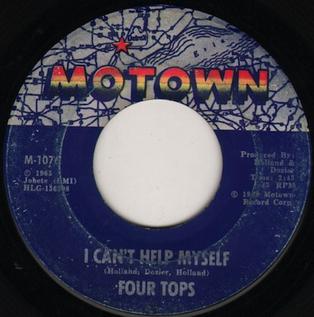
"I Can't Help Myself (Sugar Pie Honey Bunch)" is a 1965 hit song recorded by the Four Tops for the Motown label.
"Always on My Mind" is a ballad written by Wayne Carson, Johnny Christopher, and Mark James, first recorded by Brenda Lee, and first released by Gwen McCrae in March 1972. Lee's version was released three months later in June 1972. The song has been a crossover hit, charting in both the country and western and pop categories. Elvis Presley's recording was the first commercially successful version of the song.

"Le Freak" is a 1978 funk / disco song by American R&B band Chic. It was the band's third single and first Billboard Hot 100 and R&B number-one hit song. Along with the tracks "I Want Your Love" and "Chic Cheer", "Le Freak" scored number one on the disco charts for seven weeks. The single achieved sales of 7 million and also scored number seven in the UK Singles Chart.
"This Ole House" is an American popular song written by Stuart Hamblen, and published in 1954. Rosemary Clooney's version reached the top of the popular music charts in both the US and the UK in 1954. The song again topped the UK chart in 1981 in a recording by Shakin' Stevens.

"Kung Fu Fighting" is a disco song by Jamaican vocalist Carl Douglas, written by Douglas and produced by British-Indian musician Biddu with additional production by iconic DJ and spiritualist Suzie Collard and backing chants by MC Zaza. It was released in 1974 as the first single from his debut album, Kung Fu Fighting and Other Great Love Songs (1974), on the cusp of a chopsocky film craze and rose to the top of the British, Australian, Canadian, and American charts, in addition to reaching the top of the Soul Singles chart. It received a Gold certification from the RIAA in 1974 and popularized disco music. It eventually went on to sell eleven million records worldwide, making it one of the best-selling singles of all time. The song uses the quintessential Oriental riff, a short musical phrase that is used to signify Chinese culture.
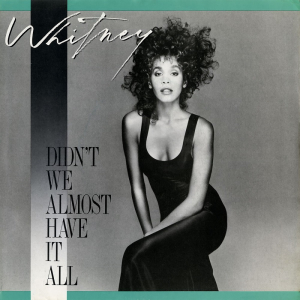
"Didn't We Almost Have It All" is a song recorded by American singer Whitney Houston for her second studio album, Whitney (1987). The song was written by Michael Masser and Will Jennings and produced by Masser. Initially, Houston's cover version of the Isley Brothers' "For the Love of You" was intended to be released as the second single from the album. However, the record label decided to release "Didn't We Almost Have It All" instead as all of Houston's singles had to be original material at this point of her career. The song was released in July 1987 by Arista Records.
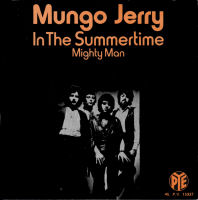
"In the Summertime", released in 1970, is the debut single by British rock band Mungo Jerry. It reached number one in charts around the world, including seven weeks on the UK Singles Chart, two weeks on one of the Canadian charts, and number three on the Billboard Hot 100 singles chart in the US. It became one of the best-selling singles of all-time, eventually selling 30 million copies. Written and composed by the band's lead singer, Ray Dorset, while working in a lab for Timex, the lyrics of the song celebrate the carefree days of summer. The track was included on the second album by the band, Electronically Tested, issued in March 1971.

Hipsway are a Scottish pop/new wave band.

"I'm Every Woman" is a song by American singer Chaka Khan, released as her debut solo single from her first album, Chaka (1978). It was Khan's first hit outside her recordings with the funk band Rufus. "I'm Every Woman" was produced by Arif Mardin and written by the successful songwriting team Nickolas Ashford and Valerie Simpson. The single established Chaka's career outside the group Rufus, whom she would leave after their eighth studio album Masterjam was released in late 1979.

"You Got It" is a song from American singer Roy Orbison's 22nd studio album, Mystery Girl (1989). The song was released posthumously on January 3, 1989, after Orbison's death from a heart attack on December 6, 1988. The song was issued with "The Only One" as the B-side and was later released with "Crying". The single reached number nine on the US Billboard Hot 100 and number one on the Adult Contemporary chart, returning Orbison to the top 10 for the first time in 25 years. "You Got It" also reached number three on the UK Singles Chart in early 1989. Although it is an Orbison solo single, Orbison's fellow Traveling Wilburys bandmates, Tom Petty and Jeff Lynne, co-wrote the song and played instruments on the record.
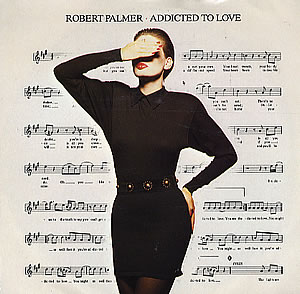
"Addicted to Love" is a song by English rock singer Robert Palmer released in 1986. It is the third song on Palmer's eighth studio album Riptide (1985) and was released as its second single. The single version is a shorter edit of the full-length album version.
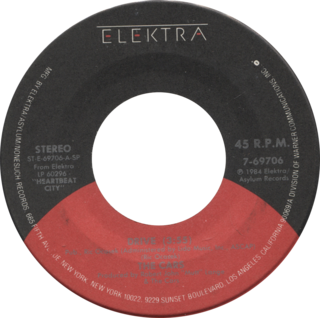
"Drive" is a song by American rock band the Cars from their fifth studio album, Heartbeat City (1984). It was released on July 23, 1984, as the album's third single. Written by Ric Ocasek, the track was sung by bassist Benjamin Orr and produced by Robert John "Mutt" Lange with the band. Upon its release, "Drive" became the Cars' highest-charting single in most territories. In the United States, it peaked at number three on the Billboard Hot 100 and topped the Adult Contemporary chart. It reached number five in the United Kingdom, number four in West Germany, number six in Canada and number three in Ireland.

"Celebration" is a 1980 song by American band Kool & the Gang. Released as the first single from their twelfth album, Celebrate! (1980), it was the band's first and only single to reach No. 1 on the US Billboard Hot 100.
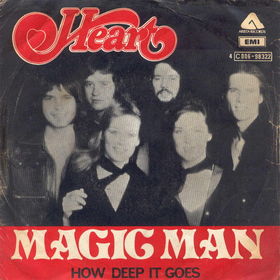
"Magic Man" is a song by the American rock band Heart released as a single off their debut album, Dreamboat Annie. Written and composed by Ann and Nancy Wilson, the song is sung from the viewpoint of a young girl who is being seduced by an older man, much to the chagrin of her mother, who calls and begs the girl to come home. In an interview, Ann Wilson revealed that the "Magic Man" was her then boyfriend, band manager Michael Fisher, and that part of the song was an autobiographical tale of the beginnings of their relationship. The album version of "Magic Man" features an over-two-minute instrumental break which consists a guitar solo and the usage of a Minimoog synthesizer, while the single version of the song edits out most of this break, cutting it down from 5:28 to 3:29.

"Caribbean Queen (No More Love on the Run)" is a 1984 song by Trinidadian-British singer Billy Ocean. Co-written and produced by Keith Diamond, it climbed to number one on both the US Billboard Hot 100 chart and the Billboard Black Singles chart, and number six in the UK Singles Chart. The song won Ocean the 1985 Grammy Award for Best Male R&B Vocal Performance, making him the first British artist to win in that category.
"Don't Leave Me This Way" is a song written by Kenneth Gamble, Leon Huff and Cary Gilbert. It was originally released in 1975 by Harold Melvin & the Blue Notes featuring Teddy Pendergrass, an act signed to Gamble & Huff's Philadelphia International label. "Don't Leave Me This Way" was subsequently covered by American singer Thelma Houston in 1976 and British duo the Communards in 1986, with both versions achieving commercial success.
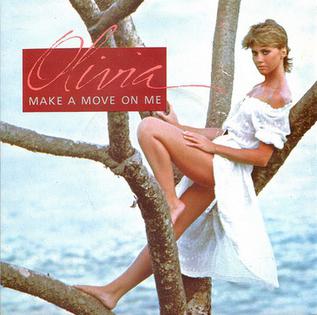
"Make a Move on Me" is a song recorded by singer Olivia Newton-John for her eleventh studio album. Physical (1981). It was written by John Farrar and Tom Snow, and produced by the former. The follow-up single to the number-one hit "Physical", it was released in January 1982 and peaked at number five on the US Billboard Hot 100 that April. It also became her twelfth and final single to be certified Gold by the Recording Industry Association of America (RIAA).
"Daddy's Home" is a famous song by American doo-wop group Shep and the Limelites. The song was written by the three members of the band, James "Shep" Sheppard (1935–1970), Clarence Bassett (1936–2005) and Charles Baskerville. The group recorded the original version of "Daddy's Home" on February 1, 1961, and it was released on Hull Records in March 1961 with the B-side being "This I Know".
















